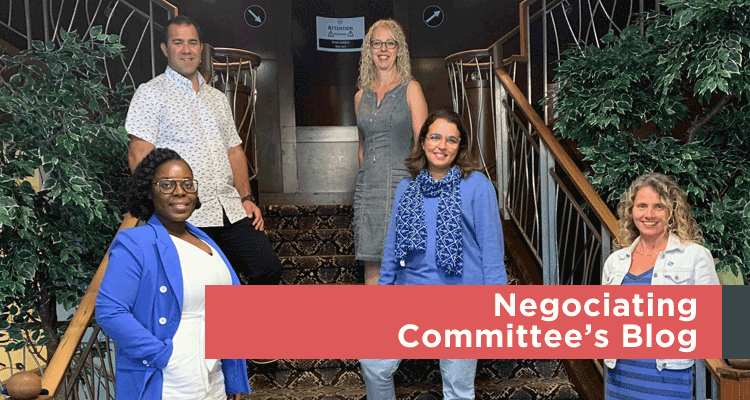
Structural measures and attractive conditions : A tentative agreement of which we can all be proud
That’s it, the FIQ has reached a tentative agreement on the sectoral part of the collective agreement, on all measures governing the healthcare professionals’ working conditions!
Going through all these steps to reach this settlement has not always been easy and went through a range of emotions in the last few weeks. Our ultimate motivation was to obtain gains commensurate with the mandates given to us, and with what the members want to see as changes.
After the delegation rejected the first tentative agreement, it was necessary not only to go get additional gains, but also work in the hope of saving our gains already made and that were in jeopardy. The last few hours at the bargaining table took place with the fear of losing everything. Every move by one party caused the other to move. The FIQ is strong and able to bounce back. We went for it all. The issues were enormous, but the gamble was worth it. We knew that the delegation was behind us, and we went after structural measures, with attractive conditions for the healthcare professionals.
We would have all liked a perfect agreement, but we obtained the best agreement possible. There are still some irritants of course, like in every negotiation, but we must keep in mind that there are major gains for everyone.
Major gains
The current context was and remains very difficult, and we think it is important to put our gains in the forefront. They each have their own stories.
A letter of understanding like the one we obtained to reduce the work overload is a major gain for all Class 1 healthcare professionals. These are non-exportable measures, meaning that the other job classes cannot obtain them. This letter of understanding includes a significant addition of staff, voluntary upgrading of positions to full time, specific conditions to make full time attractive and reducing independent labour. A provincial joint committee, on which FIQ representatives will sit, will govern the work, and ensure winning conditions for our members.
Real changes, long overdue, will also be introduced for licensed practical nurses. They will have quality positions, allowing them to stay in one centre of activities without having to go elsewhere to complete their workweek and earn a decent income. They will no longer be in a precarious situation.
Reasons to be proud
A lot of information is circulating about this tentative agreement: tracts, Info Négo bulletin and many interviews have been given, especially by the president of the FIQ, Nancy Bédard. However, we want to share with you the specific reasons that make us very proud of this tentative agreement.
- The end of job insecurity for licensed practical nurses;
- The recognition of evening work, with the possibility of working a 9/14 paid as full time;
- The recognition of all the work in CLSCs and northern clinics in the Far North, with upgrading of the hours in the workweek. These hours are already worked, without being paid. This recognition will reduce the work overload, increase weekly compensation by more than 7% and, improve retirement income because these hours will be eligible for the pension plan;
- The significant addition of staff and upgrading in CHSLDs and 24/7 units will reduce the work overload because there will be more healthcare professionals in the field;
- The increase in weekend premiums for full-time employees;
- The new premiums for employees in obstetrical care units and aeromedical evacuation services;
- A real recognition of the clinical perfusionists’ work who perform supervisory tasks;
- The budget dedicated for the training of specialty nurse practitioners (SNP).
Looking at these various gains, we can see that the “pros” far outweigh the “cons” for the community of healthcare professionals represented by the FIQ. We are proud of what we were able to squeeze out of the government.
We want to thank the delegation and members for being behind us. But beware, it’s not over yet! We will be going back to negotiate the intersectoral matters on regional disparities, the pension plan, parental rights and salaries.
We will be counting on your support once again to guide us in our decisions and presenting the results of our work to all the members!